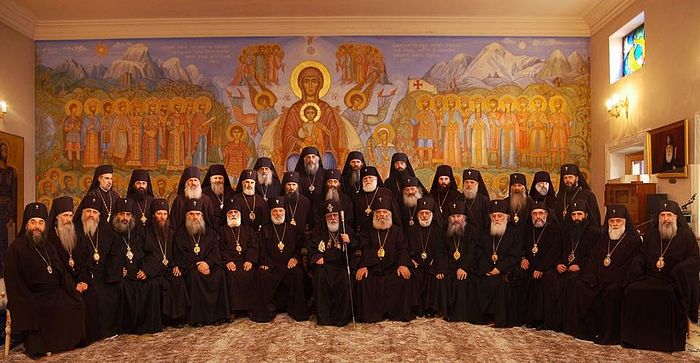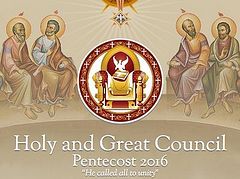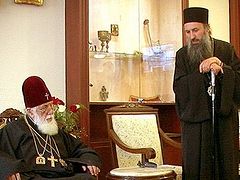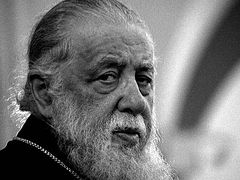Source: Facebook
June 1, 2016
Minutes of the Session of the Holy Synod (5.25.2016):
On May 25, 2016, the regular plenary session of the Holy Synod of the Orthodox Church of Georgia was held at the Patriarchate of Georgia. The Catholicos-Patriarch of All Georgia Ilia II acted as the Chairman of the session.
Metropolitan Shio (Mujiri) of Senaki and Chkhopotsku was appointed Secretary of the session. The Catholicos-Patriarch of All Georgia Ilia II gave an opening speech in which he greeted the members of the Holy Synod and congratulated the Georgian nation on the Day of the Restoration of Independence.
Besides this, two deplorable facts, which took place recently in Georgia, were mentioned at the session. The first of them was the murder of Giorgi Otkhozoria, a resident of the Region of Gali, internally displaced from Apkhazeti. This atrocious crime took place in the village of Khurcha. The Holy Synod expressed their condolences to the family of the deceased and pray for his soul. Also, the Holy Synod expressed their disapproval of the incident which took place in the village of Kortskheli.
The Holy Synod called every political and social organisation to direct their efforts towards mutual respect and peace.
The Catholicos-Patriarch of Georgia spoke on the significance of the Holy and Great Council and thanked the clergy and lay people who had participated in the preliminary work which preceded the Council. Following this, the floor was given to the hierarchs of the Holy Synod who were requested to express their opinions on the documents drawn up for the Council.
The representative of the Church of Georgia in the Secretariat of the Holy Council, Metropolitan Andrew (Gvazava) of Gori and Ateni, gave a short analysis of the mentioned documents. Metropolitan Theodore (Tchuadze) of Akhaltsikhe and Tao-Klarjeti spoke on the documents “The Sacrament of Marriage and Impediments to It” and “The Mission of the Orthodox Church in the Contemporary World”.
The Holy Synod concluded that two places in the text of “The Sacrament of Marriage and Impediments to It” require alterations, which are, specifically:
Article 10 of the subchapter “Orthodox Marriage”; Subparagraph “a” of article 5 in the subchapter “Impediments to Marriage”;
Article 10 of the subchapter “Orthodox Marriage” reads: “The Church does not accept a marriage between her members of the same sex; neither does she accept any kind of living together other than that within the bond of Holy Matrimony. The Church directs all her pastoral efforts towards the goal that her members living within such bonds attain true repentance and love, blessed by the Church”.
This subparagraph must be changed in the following way:
“The Church cannot accept a sexual relationship between persons of the same sex, neither can she accept any kind of living together other than in Holy Matrimony, and condemns this sin. The Church is concerned about the eternal lot of the immortal souls of people who continue to live with such a sin, and directs all her pastoral efforts towards their help in cognizing the extreme grievance of this sin to depart from it by way of the true repentance”.
Subparagraph “a” of article 5 of the second subchapter of “Impediments to Marriage” reads:
“Marriage between the Orthodox and the non-Orthodox is forbidden according to the canonical akriveia and is not blessed (canon 72 of the Trullo Council); however, it can be blessed through tolerance and loving-kindness, but only on condition that the children born within such a marriage will be baptised and brought up in the bosom of the Orthodox Church”.
In the aforementioned article, the first part of the text must be maintained, which reads: “Marriage between an Orthodox and a non-Orthodox is forbidden according to the canonical acribia and is not blessed (canon 72 of the Trullo Council);” but the second part, which reads: “however, it can be blessed through tolerance and loving-kindness, but only on condition that the children born within such a marriage will be baptised and brought up in the bosom of the Orthodox Church”, must be removed as it contradicts the 72nd canon of the Sixth Ecumenical Council.
As is known, no council can contradict, cancel or alter any of the canons adopted by the Ecumenical Councils.
In the document “The Mission of the Orthodox Church in the Contemporary World” the following alterations must be made:
From the main subtitle, which reads: “The Contribution of the Orthodox Church in the Cause of Attaining Peace, Justice, Freedom, Brotherhood and Love Among Nations, in Order to Eradicate Racial Discrimination, and Also to Eradicate Other Types of Discrimination”, the phrase – “and Also to Eradicate Other Types of Discrimination” – must be removed since it leaves room for a versatile understanding of the text.
Subparagraph 3 of subtitle “a” of the same document (“The Dignity of the Human Person”) reads: “A general acknowledgment of the dignity of a human person could be considered a precondition for a wider collaboration in this field. Local Orthodox Churches are called to put their mite in to inter-religious dialogue and collaboration; and while doing so, in prevailing over a manifestation of any kind of fanaticism in order to help promote friendship among peoples, freedom and peace in the entire world, for the benefit of every human being irrespective of their race and religious adherence. This implies that this collaboration excludes syncretism as well as attempts of violence from any religion over other religions”.
According to the provisions of the Synod, the aforementioned text should be formulated in the following form: “In this field, we could consider the general acknowledgement of the dignity of a human person as a precondition for a wider collaboration. The Orthodox Churches are called to put their mite into interreligious dialogue and collaboration, and while doing so, in prevailing over any manifestation of fanaticism, to help promote friendship among peoples, freedom and peace in the entire world for the benefit of every human being, with the objective of their purification, deification and salvation in the Kingdom of God, irrespective of their race or adherence to their religion. This implies that this collaboration excludes syncretism as well as attempts of violence from any religion over other religions. This, naturally, does not imply the denial of the missionary work of the Holy Church”.
In the first paragraph of subtitle “c” (“On Freedom and Justice”) the following text must be retained:
“The Orthodox Church primordially has acknowledged
and declared that peace and justice take central place in
the lives of peoples. In Christ this revelation is
characterised as the “gospel of peace” (Ephes.
6:15) since Christ “having made peace through the
blood of his cross” (Col. 1:20), “preached
peace to you who were afar off and to those who were
near” (Ephes. 2:17). He became “our
peace” (Ephes. 2:14). This peace, “which
surpasses all understanding” (Phil. 4:7), as our
Lord Himself told His Disciples before the Crucifixion, is
broader and more meaningful than that peace which is
promised by this world: “Peace I leave with you, My
peace I give to you, not as the world gives do I give to
you
(John 14:27)”.
But the second part of the same article which says: “The peace of Christ is a mature fruit of ingathering in it of everything: a human person, as the image of God, the expression of the dignity and glory of the human generation and Universe, the conventionality of the principles of peace, freedom and social justice, and lastly, the reaping of the fruit of Christian love among men and among the peoples of the world” – must be removed.
In the text also remains the last section of the text: “The true peace is the fruit of the consolidation of all Christian principles. This is the peace granted from Heaven which the Orthodox Church prays for in her everyday prayers, implores the Almighty God Who hears the prayers of those who come to Him with faith”.
Thus, the first article will be stated as follows: “The Orthodox Church has primordially confessed and proclaimed that peace and justice take central place in peoples’ lives. In Christ this revelation is characterised as the “gospel of peace” (Ephes. 6:15) since Christ “having made peace through the blood of his cross” (Col. 1:20), “preached peace to you who were afar off and to those who were near” (Ephes. 2:17). He became “our peace” (Ephes. 2:14). This peace, “which surpasses all understanding” (Phil. 4:7), as our Lord Himself told His Disciples before the Crucifixion, is broader and more meaningful than that peace which is promised by this world: “Peace I leave with you, My peace I give to you, not as the world gives do I give to you (John 14:27)”. The true peace is the fruit of the consolidation of all Christian principles. It is peace given from Heaven which the Orthodox Church prays for in her everyday prayers, implores the Almighty God Who hears the prayers of those who come to Him with faith”.
Metropolitan Stephen (Kalaijishvili) of Tsageri and Lentekhi gave a talk on the document “The Attitude of the Church to the Rest of the Christian World”. Also were read notes written on the mentioned document by Professor Edisher Chelidze of Tbilisi Theological Academy and Seminary. On the text, various opinions were expressed by Metropolitan Anania (Japaridze) of Manglisi; Metropolitan Grigol (Berbichashvili) of Poti and Khobi; Metropolitan Nicholoz (Pachuashvili) of Akhalkalaki and Kumurdo; Metropolitan Peter (Tsaava) of Chkondidi; Metropolitan Ioane (Gamrekeli) of Rustavi; and Metropolitan Jacob (Iakobishvili) of Bodbe.
It was noted that the document had been from its inception unacceptable for the representatives of the Church of Georgia and that it had only been signed at the preliminary meeting because the following sentence was written in the text: “The Orthodox Churches of Georgia and Bulgaria left the World Council of Churches; the first of them left it in 1997 and the latter – in 1998, since they have their own opinions on the activity of the World Council of Churches which is why they do not participate in the events of the mentioned Council and other activities of the inter-Christian organisations.”
The Holy Synod has concluded that the mentioned document contains ecclesiological and terminological errors and requires serious alterations. If the alterations are not made, the Church of Georgia will not sign the text.
On the initiative of Metropolitan Grigol (Berbichashvili) of Poti and Khobi, the Holy Synod has determined: a theological group should be created which will present their proposals on a number of theological questions to the Holy Synod.
The Holy Synod heard the speech of Metropolitan Sabba (Gigiberia) of Khoni and Samtredia on the organisational questions.
The Holy Synod has named the members of the delegation of the Church of Georgia. The following is a list of those named:
The Catholicos-Patriarch of All Georgia Ilia II;
Metropolitan Kalistrate (Margalitashvili of Kutaisi and
Gaenti;
Metropolitan Daniel (Datuashvili) of Sachkhere and
Chiatura;
Metropolitan Anania (Japaridze) of Manglisi;
Metropolitan Giorgi (Shalamberidze) of Tkibuli and
Terjola;
Abba Metropolitan David (Makharadze) of Alaverdi;
Metropolitan Sergi (Chekurishvili) of Nekresi;
Metropolitan Joseph (Kikvidze) of Shemokmedi;
Metropolitan Nicholoz (Pachuashvili) of Akhalkalaki and
Kumurdo, and of South America;
Metropolitan Theodore (Chuadze) of Akhaltsikhe and
Tao-Klarjeti;
Metropolitan Sabba (Gigiberia) of Khoni and
Samtredia;
Metropolitan Gerasim (Sharashenidze) of Zugdidi and
Tsaishi;
Metropolitan Andrew (Gvazava) of Gori and Ateni;
Metropolitan Stephan (Kalaijishvili) of Tsageri and
Lentekhi;
Metropolitan Shio (Mujiri) of Senaki and Chkhorotsku and
of Australia;
Metropolitan Ioane (Gamrekeli) of Rustavi;
Archbishop Spiridon (Abuladze) of Skhalta;
Archbishop Luke (Lomidze) of Sagarejo and
Ninotsminda;
Bishop Michael (Gabrichidze) of Tianeti and
Pshav-Khevsureti;
Bishop Dimitri (Kapanadze) of Khornabuji and Hereti;
Bishop Damian (Khupenia) of Samtavisi and Kaspi;
Bishop Grigol (Katsia) of Tsalka;
Bishop Dositheos (Bogveradze) of Belgium and
Holland;
Bishop Sabba (Intskirveli) of North America;
Bishop Vakhtang (Liparteliani) of Nikortsminda;
Protopresbyter Giorgi Zviadadze;
Archimandrite David Chincharauli;
Archpriest David Sharashenidze;
Archpriest Kakhaber Gogotishvili;
Hieromonk Michael Bregvadze;
Monk Anthimoz (Javakhishvili).




